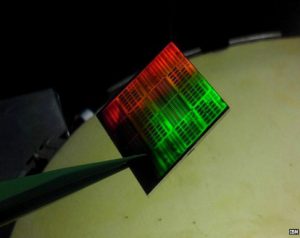Scientists in Denmark and the US have developed a new approach to detecting and strengthening ultra-weak radio signals they say could benefit a range of industries. According to the researchers, detecting extremely weak radio waves is key to many modern technologies, including satellite navigation, long-distance communications, radio telescopes and magnetic resonance imaging … [Read more...]
Widest Band Amplifier Yet Opens Door to Ultrafast Broadband
A research collaboration between European scientists has yielded a breakthrough in wideband amplifier circuit design. Researchers from University College London (UCL), UK and Chalmers University of Technology, Sweden have successfully designed and tested an amplifier that operates from low GHz frequencies to frequencies exceeding 235 GHz. The new amplifier also features a gain … [Read more...]
Graphene May Boost RF Absorption
New research from scientists in the UK examines graphene’s ability to absorb electromagnetic radiation with the creation of optically transparent broadband absorbers operating in the millimeter frequency range. Since graphene's isolation by University of Manchester scientists in 2004, research efforts worldwide have focused on harnessing its unique electrical, optical, … [Read more...]
EV ‘Charge-Packet’ Method May Prevent Electric Grid Crash
Researchers at the University of Vermont have created a new method to handle the strain new electric vehicles will place on the nation’s electric grid. Plug-in electric vehicles, while still a small portion of the automotive market, continue to grow rapidly in popularity in part due to decreasing manufacturing costs and wider availability. In 2013, sales of full electric and … [Read more...]
Better Magnetic Spin Wave Control for Electronic Devices
Researchers have developed a method for creating and controlling quick-moving waves in magnetic fields they say could improve communication and information processing in computer chips and other electronic devices. Created by scientists in the Department of Physics at New York University, the new technique relies on “spin waves,” waves that move in magnetic materials similar … [Read more...]
Graphene Circuit Competes with Silicon Technology
Scientists at IBM have taken their graphene research a step further with the development of what they claim is the world’s most advanced, fully functional integrated circuit made of wafer-scale graphene. According to the researchers, the new graphene-based IC acts as a radio frequency receiver performing signal amplification, filtering and downconversion mixing and is … [Read more...]
Signal and Spectrum Analyzer Features 500 MHz Bandwidth
Rohde & Schwarz has announced the availability of the new R&S FSW-B500 hardware option for all analyzers of the R&S FSW family, enabling measurements in a frequency range up to 67 GHz for applications including research and development, radar and satellite and testing of wireless connections such as WLAN or Beyond 4G (5G). According to the company, the large … [Read more...]
RF MEMS Technology May Increase Antenna Efficiency
A technology often used in satellite and defense applications may drastically improve smartphone performance in the near future by increasing antenna efficiency, according to new research from scientists at the University of California San Diego School of Engineering. Antennas in many modern smartphones do not function optimally in 3G and 4G/LTE wireless environments, say the … [Read more...]
Inductor Tuning Method Could Shrink Cell Phones
Scientists at Northeastern University in Massachusetts have devised a new method of tuning radio frequency circuits that could reduce the size and improve the performance of smartphones and other RF devices. “Every radio-frequency resonance circuit has two components: an inductor and a capacitor. [However,] for the many decades that we've been using RF devices, we've only been … [Read more...]
Next-Gen Flight Control System Vulnerable to Jamming Attacks
An international team of scientists has released research highlighting vulnerabilities in the upcoming next-generation air traffic control system. The new Automatic Dependent Surveillance-Broadcast (ADS-B) system is susceptible to jamming or intentional interference from attackers in possession of a wireless network and off-the-shelf equipment, according to researchers from … [Read more...]
- « Previous Page
- 1
- …
- 32
- 33
- 34
- 35
- 36
- …
- 41
- Next Page »














